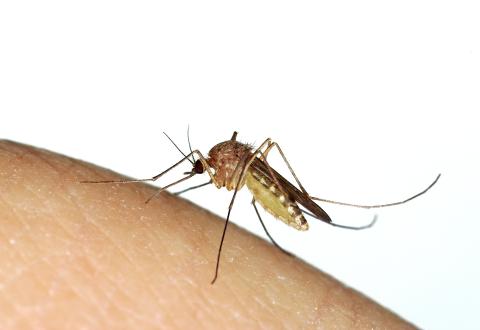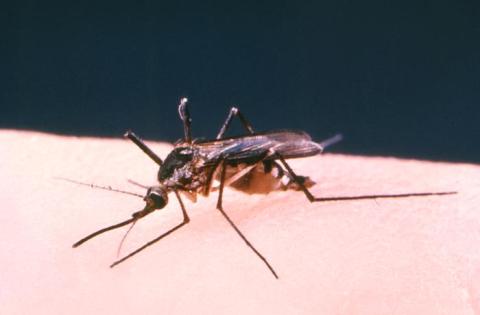St. Louis Encephalitis: About
St. Louis encephalitis is an illness spread by the bite of an infected mosquito. In Wisconsin, it is spread by Culex species mosquitoes.
In the U.S., most St. Louis encephalitis cases have occurred in eastern and central states. St. Louis encephalitis is rare in Wisconsin.
Anyone can get St. Louis encephalitis, but people who spend more time outdoors are at a higher risk of being bitten by an infected mosquito. Mosquitoes are usually most active in Wisconsin from May to September.
The mosquitoes that spread St. Louis encephalitis can be found in areas near standing water, which they need to breed. It is important to remove standing water sources, such as containers, leaves, and yard debris, to reduce breeding habitats in your yard.
For more tips, visit our Mosquito Bite Prevention page.
St. Louis encephalitis is spread to humans through the bite of an infected mosquito
- Mosquitoes get infected with St. Louis encephalitis by feeding on infected birds.
- After feeding on a bird that has St. Louis encephalitis, the virus may end up inside of the mosquito.
- Once it has the virus, a mosquito can spread the virus to other birds and mammals, including humans, when they take another blood meal.
- The mosquitoes that spread St. Louis encephalitis are active during summer and into the fall, or anytime during warm weather months.
- Few mosquitoes actually carry the virus, but it is important to take prevention measures when spending time outside.
St. Louis encephalitis is preventable. Visit our Mosquito Bite Prevention page to learn how to prevent mosquito bites.
Symptoms can start five to 15 days after being bitten by an infected mosquito
Almost 99% of people infected with St. Louis encephalitis never develop symptoms and are never diagnosed. Those that do develop symptoms often experience mild illness. Rarely, infection with the virus can lead to severe illness that includes neurologic symptoms. Severe illness is more likely to develop in the elderly or in people with compromised immune systems. The infection may be fatal in severe cases, and the risk of death increases with age.
Mild signs and symptoms
- Fever
- Headache
- Dizziness
- Nausea
- Fatigue
Severe signs and symptoms
- Inflammation of the brain (encephalitis)
- Stiff neck
- Confusion or disorientation
- Convulsions
- Paralysis
- Coma
- Death
There is currently no treatment or vaccine for St. Louis encephalitis. Over-the-counter pain relievers may be given to relieve mild symptoms.
In severe cases, patients may need to be hospitalized to receive supportive treatment.
If you believe you or a family member may have St. Louis encephalitis, contact your doctor.
DHS resources
Protecting Your Family From Mosquitoes and Ticks, P-02080 (PDF): A fact sheet with simple steps you can take to protect yourself from mosquitoes.
CDC (Centers for Disease Control and Prevention) Resources
- St. Louis Encephalitis Fact Sheet: CDC webpage with technical information on St. Louis encephalitis.
- Mosquito Bites Are Bad: An educational activity book for kids about preventing illnesses spread by mosquitoes.
Partner resources
- Wisconsin Mosquitoes and Mosquito-Borne Diseases: Information on mosquitoes and diseases they spread from our partners at the University of Wisconsin-Madison Medical Entomology Laboratory.
- Midwest Center of Excellence for Vector-Borne Disease Mosquitoes: Information on mosquitoes you may find in the Midwest and prevention resources.
St. Louis encephalitis is preventable. Visit our Mosquito Bite Prevention page to learn how to protect yourself from illnesses spread by mosquitoes.
Questions about illnesses spread by mosquitoes? Contact us!
Phone: 608-267-9003 | Fax: 608-261-4976


